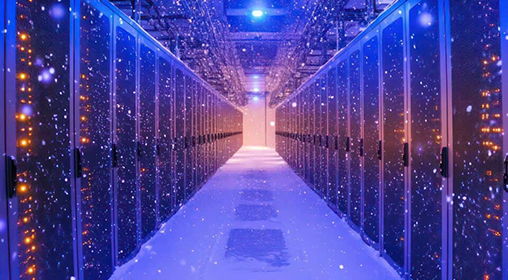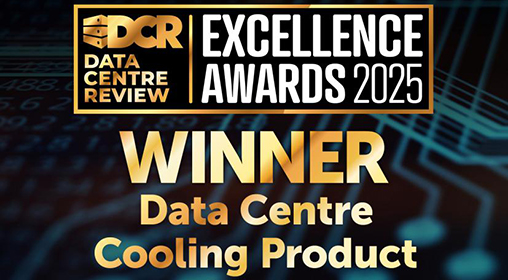



Colocation Cooling Strategies: From Air to Liquid and Everything in Between
Keeping colocation data centers cool isn’t just about temperature; it’s about trust. With multiple tenants relying on shared infrastructure to run critical operations, even minor fluctuations in cooling performance can ripple into major disruptions. As high-density data centers become the norm, the challenge grows, bringing greater heat loads, increased system complexity, and a shrinking margin for error.
For colocation providers, data center cooling is key to ensuring the reliability, flexibility, and consistent service quality their customers expect. In this article, we’ll explore today’s leading colocation cooling solutions and how each addresses the unique demands of a shared data center environment.
Critical Requirements for Colocation Cooling
Colocation data centers serve multiple tenants with diverse infrastructure needs, creating unique cooling challenges that demand specialized solutions. Given these distinctive characteristics, cooling systems must deliver exceptional performance across four critical areas:
- Ultra-high reliability (99.99% uptime) through redundancy features in cooling systems and high-quality build components.
- Cost-effective scalability to accommodate the varying and evolving needs of tenant organizations, from small deployments to enterprise-scale infrastructure.
- Regulatory compliance that adheres to industry environmental standards and regulations.
- Simplified maintenance and serviceability of the cooling units to allow on-site technicians to quickly diagnose issues, perform routine upkeep, and respond effectively in the event of system failures.
What Are the Key Colocation Cooling Strategies?
Key cooling strategies for colocation data centers include:
- Air-based Cooling Technologies: Precision cooling, free cooling, and Hot/Cold Aisle Containment
- Liquid Cooling technologies: Direct-to-chip cooling and immersion cooling
- Hybrid Cooling Solutions: Combines the strengths of both air and liquid cooling.
Air-Based Cooling Strategies
Despite growing interest in liquid cooling technologies, air-based systems remain the primary cooling approach for many colocation facilities. In fact, for deployments under 20kW per rack, air cooling is still the preferred option due to its proven performance and operational simplicity.
Air cooling continues to be widely adopted because of its reliability, cost-effectiveness, and ease of integration. With a well-established technology base, broad technician expertise, and strong alignment with industry regulations, air systems effectively support the core requirements of colocation environments. They offer scalable solutions for moderate-density applications while maintaining the high reliability standards essential in multi-tenant data centers.
Common air cooling technologies for colocation data centers include:
- Precision Cooling: Computer room air conditioning (CRAC) and computer room air handler (CRAH) units deliver targeted temperature and humidity control to specific equipment zones, enhancing reliability and energy efficiency.
- Free Cooling: Economizer systems leverage outside air when ambient conditions allow, reducing reliance on mechanical refrigeration and lowering the facility’s environmental footprint.
- Hot/Cold Aisle Containment: This strategic airflow management approach prevents hot and cold air from mixing, optimizing cooling efficiency, and reducing energy waste.
Liquid Cooling Strategies
As rack densities climb beyond 20kW, liquid cooling is becoming an increasingly popular choice in colocation data centers. With far greater heat transfer capabilities than traditional air systems, liquid cooling is sometimes better suited for high-density environments and emerging workloads like AI, machine learning, and HPC (high-performance computing).
Liquid cooling reliably handles higher densities and supports the broader cooling goals of colocation facilities. Its systems provide substantial energy efficiency gains, scale effectively with tenant growth, and meet compliance and operational standards. As liquid cooling technologies continue to evolve and gain traction, colocation providers can leverage these innovative solutions to support next-generation workloads.
Common liquid cooling technologies for colocation data centers include:
- Direct-to-Chip Cooling: This approach delivers coolant directly to processors and other heat-generating components through specialized cold plates and distribution systems, offering localized, efficient thermal management.
- Immersion Cooling: Entire servers are submerged in non-conductive liquid, enabling exceptional heat removal, energy savings for ultra-dense workloads, and easy scalability by simply adding more servers to the tank.
Hybrid Cooling Solutions
Hybrid cooling combines the strengths of both air and liquid systems to create adaptable, high-performance environments. This approach is particularly well-suited to colocation facilities with diverse tenant requirements, supporting legacy systems, traditional workloads, and emerging high-density configurations side by side.
By default, hybrid cooling strategies offer key advantages simply by combining two complementary technologies instead of relying on a single system. This dual approach makes them especially effective for addressing the complex cooling needs of colocation facilities:
- Built-in Reliability: Dual-system redundancy ensures continuous operation. Even if one system fails or phases out, the other remains fully functional.
- Flexible Scalability: Having two integrated cooling methods allows facilities to adapt easily to varying tenant requirements and rack densities.
- Environmental and Compliance Efficiency: With dynamic control across both systems, hybrid cooling offers the flexibility to adjust output in real time, scaling up or down as needed to minimize energy waste and maintain compliance.
Your Next Step Toward Smarter Colocation Cooling
Colocation data centers have several proven cooling strategies to choose from, but selecting the right cooling solution requires careful consideration of key factors like equipment density, energy efficiency goals, budget constraints, and geographic location.
AIRSYS helps colocation providers navigate these decisions and implement high-performance cooling systems tailored to their needs. Our commitment to reliability, sustainability, and continuous innovation ensures that every solution we deliver meets today’s demands while being ready for tomorrow’s growth. If you’re ready to rethink the cooling strategy for your colocation facility, contact us today and discover how AIRSYS can help you design a solution that delivers reliability, efficiency, and long-term scalability.
Related Posts

Data Center Energy Efficiency: Which Metrics Matter Most?
Cooling systems drive a large share of data center energy use, making them one of the most critical areas to target for improving overall energy efficiency. As demands on data centers increase, cooling will be key to powering the next generation of data centers, further emphasizing the need to measure and manage its impact.
read more
Data Centers Scale on Flexible Cooling Strategies
Can you remember going on a road trip 15 years ago? Or how you got around your hometown? Chances are, you used a paper map. At the time, it was the only way to navigate unfamiliar areas. But as cities grew, routes developed, and technologies we couldn’t have imagined back then emerged, paper maps could no longer meet the need. Static maps couldn’t keep up with infrastructure expansion, let alone provide real-time traffic updates or recommend the best routes. And so, gradually, paper maps faded from our lives.
read more
Aegis Wins “Data Centre Cooling Product of the Year” at the 2025 DCR Excellence Awards
London, May 14, 2025 — Aegis, a wholly owned subsidiary of AIRSYS, has been awarded the prestigious “Data Centre Cooling Product of the Year” at the 2025 Data Centre Review (DCR) Excellence Awards, in recognition of its groundbreaking product TurboPlate.
read more